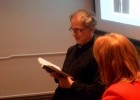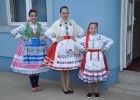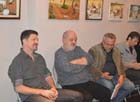A concert honouring the composer William Figuš Bistri was held in a Slovak town, Padina
 |
In the cultural history of Slovaks who live in Serbia, we don’t have many composers of importance to all minoritie, and who lived and created in the areas of modern day Hungary, Romania and Serbia. On the contrary, only two composers documented in their biographies that they had lived among us, and one of them is William Figuš Bistri. The other one is Mikulaš Šnajder Trnavski. These two composers had met right here in our country, in Zrenjanin, then known as Veliki Bečkerek. On this occasion in 1906, M. Š. Trnavski presented the composition by W. F. Bistri called “Pani Rákociová” for the first time.
The fact that the mentioned creative figures lived and created in this area is still the reason worth reminding ourselves of their works. That is exactly why the Cultural Institute of Vojvodina’s Slovaks hosted a unique musical experience in Padina, on Saturday, September 7th 2013. The program consisted of the compositions of W. F.Bistri, as well as a video footage which illustrated this prominent person to the numerous audiences, using picture and words.
Introducing the audience to the period between 1903 and 1907 when William Figuš Bistri resided in Padina, was prepared by the CIVS’ team. According to the idea and texts of Milina Sklabinski, with the assistance of the video material by Marijana Bardi, moderators Jan Struhar and Marta Pavčok, an experienced tv director Ljubiša Sremčević prepared several video reports that were alternating with the musical performances of our local artists.
Firstly, Ljudmila Beređi Stupavski introduced herself to the audience, by performing songs from the collection of Tisíc slovenských ľudových piesní (A Thousand Slovak Folk Songs): “God, the Love”, “Pale, I Am Pale”, “Tomorrow, Day after Tomorrow”, “Girl, Don’t Marry” and “Mountains, Green Mountains” accompanied on the piano by a renowned young pianist Marek Stupavski. This collection inspired Denis Galas and Vlastimir Povolni who performed the songs called “I Haven’t Slept in Four Nights” and “Under the Hills in That Valley” accompanied on the piano by Marijana Marčok.
 |
The second musical act of the program was this composer’s most important work – the first Slovak opera called “Detvan”. This opera in three acts was premiered in 1928 at the National Theatre in Bratislava. The audience in Padina had the opportunity to hear the overture to the opera in the joint performance of the pianist Marek Stupavski and Dina Šuklar.
 |
The next segment of the program was devoted to solo songs. Songs from the series Po poliach a lúkach (On fields and Meadows) op. 53 were performed. The original Slovak songs Ej, zaleť vtáča (Hey Bird, Fly), Ťažké je lúčenie (Goodbyes Are Hard), Zabudnutie (Oblivion), Janík a Hanička (Janík and Hanička) i Ľúbosti, ľúbosti were performed by the renowned opera singer Jaroslava Benkova Vlček, accompanied on the piano by the piano professor Dina Šuklar.
The highlight of the evening was the performance of a male chamber choir from Padina, which sang the song Zmráka sa (It’s Getting Dark) in four voices (written by Ivan Kraska) and folk songs A v tej našej záhradôčke (In Our Little Garden) and Ej, ženy, ženy (Hey, Women, Women)… Chorus, conducted by Janko Tomek, performed for the first time and had a great success. These boys have all the preconditions to surprise us with their great performances in future by performing numerous compositions of Slovak authors.
 |
A chamber choir Musica Viva also performed in the program, singing Na zelenej lúčke and Limbora, limbora accompanied on the piano by Vladimir Kovač, under the guidance of Marijana Stanković Krivak and Ana Medveđ. The concert was successfully ended with the composition Darmo chodím darmo in a joint performance of the choir Musica Viva and the male choir from Padina.

The lifelong creativity of W. F. Bistri could not be imagined without the folk songs. William Figuš Bistri showed his love for the Slovak people in his musical works which he left to entire Slovakia, and to us, Vojvodina’s Slovaks, who have a great respect for that particular period of his life that he spent among us, in Padina - said the director of the Cultural Institute of Vojvodina’s Slovaks - Milina Sklabinski while she was addressing the audience.

Surely, one of the following steps will be setting up a memorial plaque fot W. F. Bistri, so that the local, as well as the future residents would remember that, at the beginning of the 20th century, a Slovak composer and author of the first Slovak opera - William Figuš Bistri lived and worked in their town.
 |































